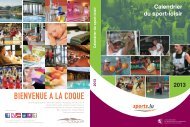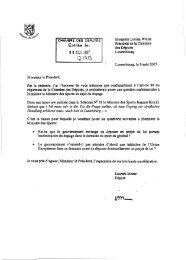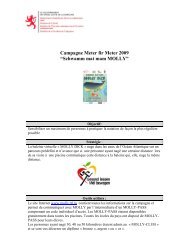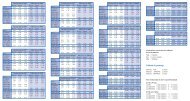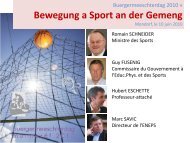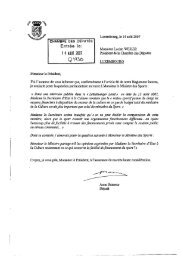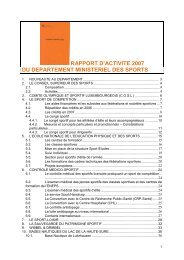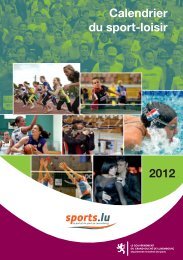The Seven Key Principles of LTAD - Sports .lu
The Seven Key Principles of LTAD - Sports .lu
The Seven Key Principles of LTAD - Sports .lu
You also want an ePaper? Increase the reach of your titles
YUMPU automatically turns print PDFs into web optimized ePapers that Google loves.
Long Term Athlete Development:<br />
From <strong>Principles</strong> to Practice –<br />
A UK Perspective<br />
Luxemburg City - 15 th January 2006<br />
National Centre for Sport and Culture<br />
By Graham Ross<br />
Project Officer<br />
sports coach UK
Session Aim<br />
To provide an overview <strong>of</strong> the Long<br />
Term Athlete Development Model (<strong>LTAD</strong>)<br />
and its key principles.<br />
To share UK experiences <strong>of</strong> the application <strong>of</strong><br />
the <strong>LTAD</strong> model principles into changes to our<br />
sports system.
Session Structure<br />
Introduction - Why did we need <strong>LTAD</strong>?<br />
Overview <strong>of</strong> the <strong>LTAD</strong> Model<br />
Outline <strong>of</strong> key <strong>LTAD</strong> <strong>Principles</strong><br />
<strong>LTAD</strong> Application in the UK<br />
Summary & Conc<strong>lu</strong>sion
Why did we need <strong>LTAD</strong>?<br />
Sydney 2000<br />
Athens 2004
Quarter Final<br />
Sporting Nation!!<br />
Now a Non-Qualifying Nation!
<strong>Sports</strong> Participation Trends
Obesity Trends
UK COACHING SYSTEM VISION<br />
Cohesive, ethical and va<strong>lu</strong>ed<br />
system supported by skilled<br />
coaches at all stages <strong>of</strong><br />
development in sport<br />
Recognised as world leading<br />
coaching system by 2016<br />
<strong>LTAD</strong> model is integral part <strong>of</strong><br />
achieving this vision
Win Win Outcome<br />
Sport<br />
Performance<br />
Lifelong<br />
Physical<br />
Activity<br />
Participation<br />
Physical<br />
Literacy
<strong>LTAD</strong> is not a panacea<br />
but it can be used as a<br />
powerful tool for:<br />
cultural change<br />
developing a common vision/purpose<br />
building a more effective sports system
Overview <strong>of</strong><br />
Long Term<br />
Athlete<br />
Development<br />
Model
What is <strong>LTAD</strong> ?<br />
<strong>LTAD</strong> is not just another plan<br />
<strong>LTAD</strong> is a philosophy<br />
<strong>LTAD</strong> is a tool for change, culture<br />
change in sport<br />
Identifies the current gaps in the<br />
sport system and provides<br />
guidelines for problem solving
<strong>LTAD</strong><br />
…<br />
Is a guide for planning for optimal<br />
performance for all stages <strong>of</strong> athlete<br />
development<br />
Is a framework for full sport system<br />
alignment and integration<br />
It is designed on empirical / practical<br />
coaching experiences and on scientific<br />
principles
<strong>The</strong> Long-Term Player/Athlete<br />
Development Model (Generic)
Active Start<br />
<strong>Seven</strong><br />
Stages<br />
<strong>of</strong><br />
Canadian<br />
<strong>LTAD</strong><br />
Model<br />
Note: Generic Model for<br />
Late Specialization <strong>Sports</strong><br />
FUNdamental<br />
(Many)<br />
Learning to Play & Practice<br />
(3)<br />
Training to Train<br />
(2)<br />
Training to Compete<br />
(1)<br />
Training to Win<br />
Active for Life
Remember<br />
A model is a simplification <strong>of</strong> a complex process<br />
Its application varies between sports<br />
Its application varied between individuals<br />
BUT…. It helps identify “patterns <strong>of</strong> success”
Active Start Stage<br />
Chronological Age<br />
Males and Females: 0-6 (approx)<br />
Active Start<br />
FUN Playful Games<br />
Daily physical Activity<br />
Movement & Dance<br />
Basic Movement Skills<br />
Early physical activity habits!
FUNdamental Stage<br />
Chronological/ Developmental Age<br />
Males 6-9 and Females 6-8 (approx)<br />
Fundamentals<br />
Fun & participation<br />
Movement Skills<br />
General development<br />
Ethics <strong>of</strong> sport<br />
e.g. Movement education (ABCs) –<br />
Agility,Balance & Co-ordination & Speed
Learning to Play & Practice<br />
Chronological/ Developmental Age<br />
Males: 9-12 Females: 8-11 (approx)<br />
Learning to Play<br />
& Practice<br />
Early diversification<br />
Develop range <strong>of</strong> sports skills<br />
Focus on skill development<br />
Festival Participation<br />
Sampling a range <strong>of</strong> basic sport skills to<br />
develop competence and confidence
Training to Train<br />
Developmental Age – onset <strong>of</strong> PHV<br />
Males: 12-16 Females: 11-15 (approx)<br />
Developing Fitness<br />
and<br />
sport specific skills<br />
Building the engine and<br />
starting to specialise
Training to Compete<br />
Chronological Age<br />
Males: 16-23 +/-<br />
Females: 15-21 +/- (approx)<br />
Optimizing the<br />
engine and<br />
developing<br />
sport / event /<br />
position skills<br />
Specialised training,<br />
competition and<br />
recovery programme
Training to Win<br />
Chronological Age<br />
Males: 19 +/- Females: 18 +/- (approx)<br />
Maximizing the engine<br />
and enhancing<br />
event / position skills<br />
Peak Performance
Active for Life<br />
Enter at any age<br />
Healthy<br />
Life-long<br />
Physical<br />
Activity
<strong>Key</strong> <strong>LTAD</strong> <strong>Principles</strong>
<strong>The</strong> <strong>Seven</strong> <strong>Key</strong> <strong>Principles</strong> <strong>of</strong> <strong>LTAD</strong><br />
Team <strong>Sports</strong><br />
Racket<br />
<strong>Sports</strong><br />
Gymnastics<br />
FMS<br />
FSS<br />
Peak<br />
Height<br />
Velocity<br />
Developmental<br />
Age<br />
Growth and<br />
Development<br />
Specialization<br />
FUN<br />
damentals<br />
Physical<br />
Literacy<br />
C 10<br />
Trainability<br />
<strong>LTAD</strong><br />
10 Year Rule<br />
C 10<br />
Annual Plans<br />
Periodisation<br />
10<br />
Periods<br />
Phases<br />
Meso/Micro<br />
Cycles<br />
System<br />
Alignment<br />
Kaizen<br />
Research<br />
Education<br />
Coaching<br />
Competition<br />
Modernize<br />
Balyi , Ross, Wenger 2004<br />
C<strong>lu</strong>bs
<strong>The</strong> <strong>Seven</strong> <strong>Key</strong> <strong>Principles</strong> <strong>of</strong> <strong>LTAD</strong><br />
Principle 1 - Growth and Development<br />
1.1. Chronological, Biological, Developmental age<br />
1.2. Peak Height Velocity<br />
1.3. Windows <strong>of</strong> Trainability<br />
1.4. Programme design for the developmental athletes<br />
1.5. How to monitor PHV ?<br />
1.6. Nutrition and the growing child<br />
1.7. Mental, Cognitive and Emotional Development<br />
1.8. Parental education
Developmental Age
Parental Education<br />
“I think about him a lot when I<br />
out here playing and practising<br />
because the fundamentals<br />
I learnt from him….the grip, the<br />
posture, stance and aim……..<br />
those are the things l learnt<br />
from him.”<br />
<strong>The</strong> Times Wednesday<br />
July 19 th , 2006
Principle 2 - <strong>The</strong> FUNdamentals<br />
2.1. FUNdamental Movement Skills<br />
2.2. Athletics, Gymnastics and Aquatics<br />
2.3. FUNdamental <strong>Sports</strong> Skills<br />
2.4 Concept <strong>of</strong> Physical literacy<br />
Principle 3 – Specialisation<br />
3.1. Early specialisation sports<br />
3.2. Late specialisation sports<br />
3.3. Late entry and transfer sports
Physical Literacy<br />
Sport Performance<br />
Participation<br />
Fundamental Sport Skills<br />
Fundamental Movement Skills
Adapted From Mike Jess,<br />
University <strong>of</strong> Edinburgh<br />
Can’t Catch? – Won’t play!<br />
Aerobics<br />
Golf<br />
Cycling<br />
Athletics<br />
Skateboard<br />
Squash<br />
Badminton<br />
Tennis<br />
Jogging<br />
Hockey Gymnastics<br />
Swimming<br />
Walking<br />
Canoeing<br />
Sailing<br />
Soccer<br />
Dance<br />
Cricket<br />
Rounders<br />
Baseball<br />
S<strong>of</strong>tball<br />
Netball<br />
Basketball<br />
Rugby<br />
Handball<br />
American<br />
Football
Principle 4 – Periodisation<br />
4.1. Who are the training, competition and recovery<br />
programmes designed for?<br />
4.2. Long-term planning<br />
4.3. Quadrennial planning<br />
4.4. Annual planning<br />
4.5. Calendar planning<br />
4.6. Functional training - prevention<br />
4.7. Ancillary Capacities<br />
4.8. Monitoring and Eva<strong>lu</strong>ation
Ancillary Capacities<br />
e.g. Sleep
Principle 5 - Ten year rule<br />
5.1. <strong>The</strong>re are no shortcuts !<br />
5.2. <strong>The</strong>re are no excuses !<br />
5.3. 10 year rule<br />
5.4. 10.000 hours rule<br />
5.5. 10% (90%?)
Principle 6 - System Alignment<br />
and Integration<br />
6.1. Seamless, athlete centred <strong>LTAD</strong><br />
6.2. System <strong>of</strong> Competition (Calendar planning)<br />
6.3. System <strong>of</strong> Coaching<br />
6.4. System <strong>of</strong> C<strong>lu</strong>bs<br />
6.5. Local/ Regional / National<br />
6.6. Implementation<br />
Principle 7 - Kaizen or “Continuous Improvement”<br />
7.1 Modernise<br />
7.2 Research<br />
7.3 Educate
<strong>LTAD</strong> Application in UK<br />
Background<br />
Update on <strong>LTAD</strong> <strong>Sports</strong><br />
Lessons Learnt
Background<br />
<strong>LTAD</strong> workshops (2000)<br />
Draft sports policy paper (2001)<br />
<strong>LTAD</strong> pilot project (2002 phase 1 sports)<br />
Input into Government <strong>Sports</strong> Strategy (2003)<br />
<strong>LTAD</strong> pilot project phase 2 & 3 sports (2004/5)<br />
<strong>LTAD</strong> initiatives with other partners (2005/6)<br />
Development <strong>of</strong> UK Coaching Framework (2006/7)<br />
…...……“GOLDEN THREAD”
<strong>LTAD</strong> Project<br />
Management Phases<br />
Phase<br />
1<br />
Design &<br />
Developmen<br />
t<br />
Phase<br />
2<br />
Planning to<br />
Implement<br />
Implementatio<br />
n<br />
Phase<br />
3
Pioneering <strong>LTAD</strong> <strong>Sports</strong>
Update on <strong>LTAD</strong> <strong>Sports</strong><br />
Pilot <strong>Sports</strong> (2002/03, Year 1):<br />
- Cricket, Swimming & Women’s Football<br />
- Netball, Rugby Union & Tennis<br />
Year 2 sports (2003/04, Year 2)<br />
- Rugby League, Hockey<br />
- Gymnastics, Canoeing<br />
- Badminton & Judo
Year 3 (2004/05):<br />
Golf<br />
Squash<br />
Equestrianism<br />
Diving<br />
Waterpolo<br />
Synchronised<br />
swimming
Published <strong>LTAD</strong> Frameworks
PATHWAY OF FUNDAMENTAL<br />
MOVEMENT IDEAS<br />
Foundation Years<br />
Stage 5<br />
CORE SKILLS<br />
6 - 8 years<br />
Stage 4<br />
FOUNDATION SKILLS<br />
4 -6 years<br />
Stage 3<br />
INDEPENDENT CHILD<br />
2½ - 4 years<br />
Early Years<br />
Stage 2<br />
ADULT & CHILD<br />
Walking – 2½ years<br />
Stage 1<br />
FUN 4 BABY<br />
8 weeks - walking
Lessons Learnt<br />
along the way!
Impact <strong>of</strong> adopting <strong>LTAD</strong><br />
On Parents<br />
On Teachers & Coaches<br />
On Coach Education and Development<br />
On Community Sport e.g. schools & c<strong>lu</strong>bs<br />
On elite sport (e.g. Academies/Institutes)<br />
On Competition and Officials<br />
On the entire sports system<br />
»Locally<br />
»Nationally<br />
»Internationally
<strong>Key</strong> Challenges<br />
It’s a Marathon race (10 year rule!!)<br />
Need for sport led process <strong>of</strong> culture change<br />
Different stages <strong>of</strong> readiness to implement<br />
Tailored support service<br />
Modernization <strong>of</strong> sport!
Modernisation<br />
ONE SPORT &<br />
ONE COMMON<br />
VISION!
NGB Challenges<br />
STRATEGIC PLANNING & ENGAGEMENT OF<br />
WHOLE SPORT IN CHANGE PROCESS<br />
MODERNISATION – CAPACITY BUILDING &<br />
WORKFORCE DEVELOPMENT<br />
HIGH QUALITY COACHING AT ALL LEVELS<br />
ACCESS TO APPRORIATE FACILITIES & SUPPORT<br />
SERVICES<br />
ACCESS TO APPROPRIATE PARTICIPATION &<br />
COMPETITIVE OPPORTUNITIES<br />
FUNDAMENTALS – MULTI SKILLS CLUBS &<br />
LINKS TO SCHOOLS NETWORK
<strong>LTAD</strong> is a tool to help:<br />
•Define “athlete centeredness” - dynamic & flexible<br />
• Design & develop sport-specific talent ladders<br />
• Better co-ordinate NGB departments<br />
• Identify system gaps & so<strong>lu</strong>tions<br />
• Evidence base to justify change
What suits one NGB<br />
might not suit the next
Success Factors<br />
- Top level NGB support<br />
- Commitment <strong>of</strong> NGB lead <strong>of</strong>ficer<br />
- Well organised NGB planning group<br />
- Recruiting “Champions for Change”<br />
- Embedding <strong>LTAD</strong> implementation plan into<br />
overall NGB strategic planning process
Limiting Factors<br />
Limited time and resources<br />
History & traditions<br />
NGB control vs. inf<strong>lu</strong>ence<br />
Communication and consultation<br />
Capacity to deliver
Building a Common Vision
Summary and Conc<strong>lu</strong>sions<br />
About developing a clear athlete pathway<br />
About high quality Physical Education,<br />
Coaching and <strong>Sports</strong> Development<br />
Building integrated sport systems around <strong>LTAD</strong><br />
Evo<strong>lu</strong>tion not revo<strong>lu</strong>tion ………<br />
– you cannot microwave success!!
Summary & Conc<strong>lu</strong>sion<br />
<strong>Key</strong> Messages:<br />
Early days in UK for <strong>LTAD</strong>……..NGB led “whole sport”<br />
process <strong>of</strong> cultural change…”Building the Foundations”<br />
Joining up programme planning &<br />
delivery to enable integrated approach<br />
Generation common vision, va<strong>lu</strong>es and velocity<br />
Embedding <strong>LTAD</strong> change into sport plans
Win Win Outcome<br />
Sport<br />
Performance<br />
Lifelong<br />
Physical<br />
Activity<br />
Participation<br />
Physical<br />
Literacy
<strong>The</strong> Challenge <strong>of</strong> Implementation!
UK COACHING SYSTEM VISION<br />
Cohesive, ethical and va<strong>lu</strong>ed<br />
system supported by skilled<br />
coaches at all stages <strong>of</strong><br />
development in sport<br />
Recognised as world leading<br />
coaching system by 2016
<strong>Key</strong> Emerging <strong>The</strong>mes<br />
<strong>LTAD</strong> aligned to:<br />
• Coaching structure & system<br />
• Competition structure & system<br />
• C<strong>lu</strong>b structure & system<br />
• Corporate NGB structure<br />
• Corporate Planning<br />
Changing Culture!
Long<br />
Term<br />
Athlete<br />
Development<br />
Building Pathways<br />
for sport in the UK<br />
Source: NCTC, Ireland
To finish….<br />
“THE ROAD TO SUCCESS IS<br />
ALWAYS UNDER CONSTRUCTION”<br />
Lily Tomlin
Any Questions ?



